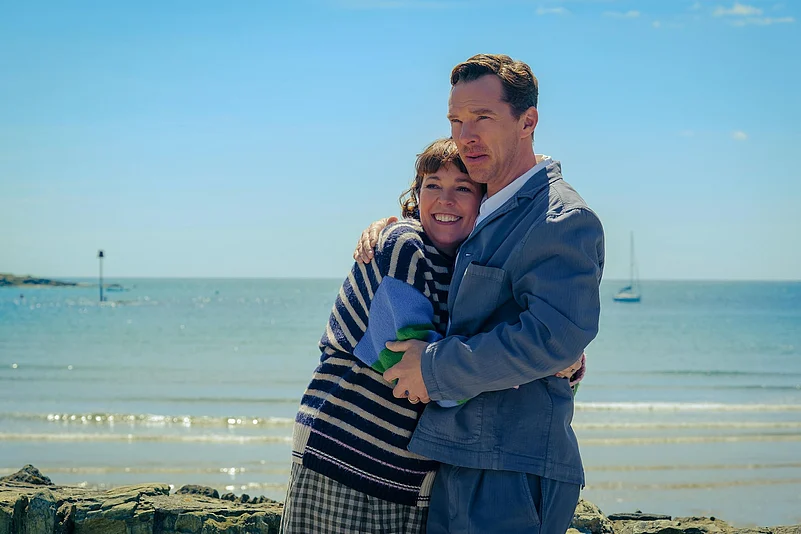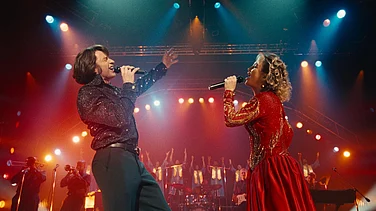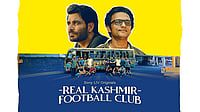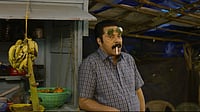
The Roses has Benedict Cumberbatch and Olivia Colman in lead roles.
Directed by Jay Roach, it released on August 29.
The film dissects the institution of marriage and gender roles within it.
In the modern world, marrying or staying in a marriage has little ethical, religious, or cultural weight. Therefore, contemporary cinema can explore the fault lines of this institution without restraint, without holding it sacrosanct. It is a truth universally acknowledged that a marriage in possession of “good health” must be organised around traditional norms of gender relations. Jay Roach’s The Roses satirises this idea of good health from the first scene. Ivy (Olivia Colman) and Theo Rose (Benedict Cumberbatch) sit in front of a therapist and are asked to list out the qualities they like in each other.

Theo begins with, “I would rather live with her than a wolf,” nodding to the viral internet debate where women chose to be stuck with a bear over a man in the woods. And Ivy ends with a barrage of insults, squeezing in a particularly hilarious line—“His breath smells like an anchovy that’s been in the piss all night.” Theo laughs. The spectator joins. But the therapist, aghast and unable to perceive this brand of humour, concludes Ivy and Theo are incapable of saving their marriage.

The turning point for The Roses is the storm that wrecks Theo’s designed East Bay Maritime Museum, while simultaneously bringing in stranded customers to Ivy’s newly opened restaurant, “We’ve Got Crabs.” From this literal catastrophe, his career as an architect atrophies; hers, as a chef, advances to great heights. The spatial intercutting is sharp: Theo’s distress at the sight of his building in tatters is paralleled with Ivy’s packed restaurant. The jibe is at the loss of phallic structure—his ship that could never sail. Ivy soon confesses she has resisted her genius for too long, signalling a shift in gender roles. Theo is tasked with carrying out the domestic labour of raising their children, while the responsibility of financial stability rests on her.

A particular kind of bitterness ensues not necessarily because roles get reversed, but because Ivy yearns for both professional success and maternal joie de vivre. The spectator suspects that Theo was satisfied with primarily being a brilliant architect; being a father came second. But Ivy struggles with such a demarcation—she desires both. When the work of care is put on Theo, he is shown to constantly battle narcissism and navigate his now defunct goal-oriented approach to life. Though, one senses that Ivy must have been more sensitive to the needs of their relationship at the expense of her own identity. She is awkward with her success and unfamiliar with the feelings it provokes in her, as opposed to Theo, who is accustomed to and comforted by validation. In anticipation of the psychic toll on Theo, Ivy comes up with the idea that he build their dream house and provides monetary support for his vision.

However, they keep getting estranged. He admits to sporadic hatred for Ivy, and she, on her part, believes Theo stole the children from her. Earlier in the film, when the children quip that their father is suicidal, and in case he kills himself, would they be orphans? Ivy responds with a firm “No, you’d still have me,” rather than assuage the fear of having a suicidal parent. One realises that she is more focused on registering her presence in their life than accounting for the father’s absence. Her melancholia of not being able to participate in her children’s growing up is cruelly shut down by Theo. One lingering criticism is that although the film insists through Theo that Ivy cannot apologise, she is tentative and borderline apologetic for her ascent to fame. Fixating on her refusal to say ‘sorry’ obscures the concrete actions she undertakes to prevent an imminent estrangement.
As the divorce proceedings begin, they destroy each other’s prized possessions, get on each other’s nerves in inventive ways, making their altercation a delicious cinematic treat. Their bitterness and cruelty directed at each other, however, contain an undertone of softness, woven between moments of total understanding and profound friendship. The film’s success lies in deriving an absurd tenderness from dark humour to construct a refreshing form that dissects the breakdown of relationships by conducting a fascinatingly gentle post-mortem. Perhaps the credit belongs to Tony McNamara, who adapts both the novel (1981) and film (1989) of The War of the Roses for Roach. He stylistically reconstitutes his shared taste for absurdity with Yorgos Lanthimos to align with the sensibilities of the Meet the Parents (2000) director.
The climax is an explosion of imagination, where the murderous, manic impulse to free oneself from one's partner coexists with the admission that constant conflict is the only way to survive a relationship. This surrender to mental and bodily exhaustion demanded in exchange for the continuity of love, The Roses tells us, ends only in a cheeky call to death.
Srishti Walia is a doctoral student of Cinema Studies at the School of Arts and Aesthetics, Jawaharlal Nehru University, New Delhi.



























